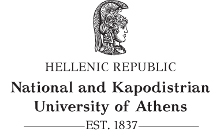School of Economics and Political Sciences
Department of Political Science and Public Administration
POLITICAL PHILOSOPHY I
An overview of the central problems and concepts of ancient political theory with emphasis on the different theories of justice that were presented by ancient thinkers and the normative justification they provide to different proposals of political organisation.
The course aims to
- offer a review of the foundational political ideas of antiquity
- examine the irreception and influence on the history of political thought
- comparatively evaluate its similarities and difference with modern political ideas
- provide the necessary theoretical background for similar advanced courses.
Syllabus
JUSTICE
- The primitive justice of Greek popular morality and the early thinkers
- The Sophists on the relation between justice and individual interest
- The Sophistic defence of injustice
- The Socratic critique of Greek popular conception of justice
- Plato on justice as psychic harmony
- Aristotle on justice as a disposition of the soul and fairness in social interactions
- Epicurus on contractarian justice
- The Stoics on the rational natural law
- Thomas Aquinas on divine and political law
POLIS and CONSTITUTIONS
- Protagoras and the Epicureans on the instrumental value of polis for security
- Aristotle on the intrinsic value of political naturalism
- The historians on democracy
- Socrates on the Athenian democracy
- The Platonic critique of democracy and his epistocratic proposal
- The Aristotelian classification of constitutions
- Aristotle on political distribution
- Aristotle on democracy
- Ancient theories about the mixed constitution
- The Christian commonwealth
Learning outcomes
Completion of the course will enable students to
- understand the fundamental ideas and arguments of ancient political philosophy and the historical context in which they emerged
- realise the significance of ancient conceptions for the political thought and experience of the modernity
- appreciate the ethical dimension of ancient political thought.
More information and support material at the course's e-class pages.
